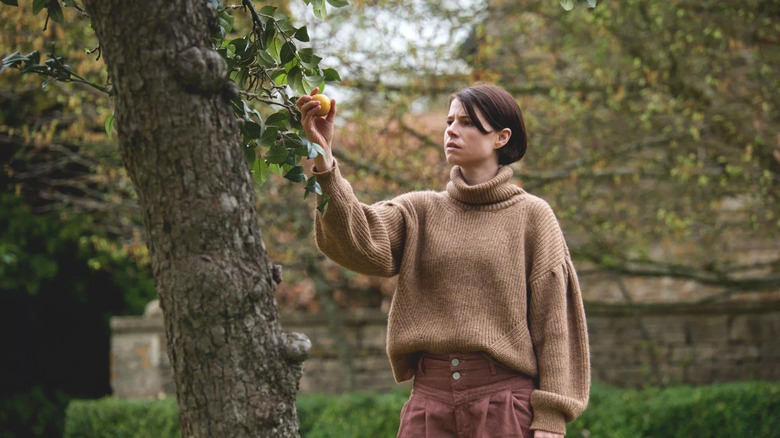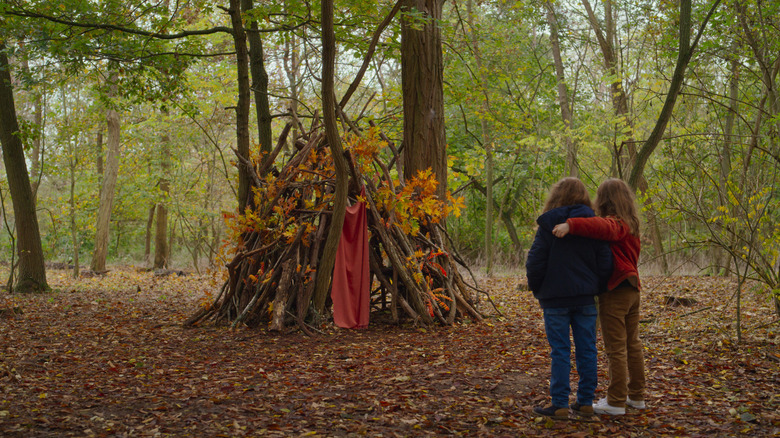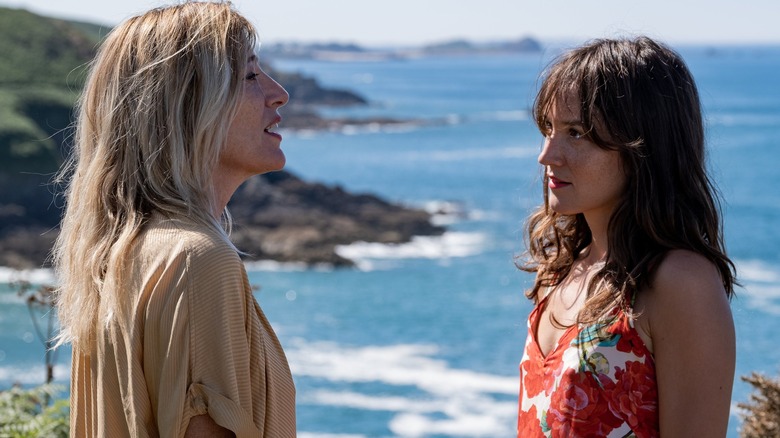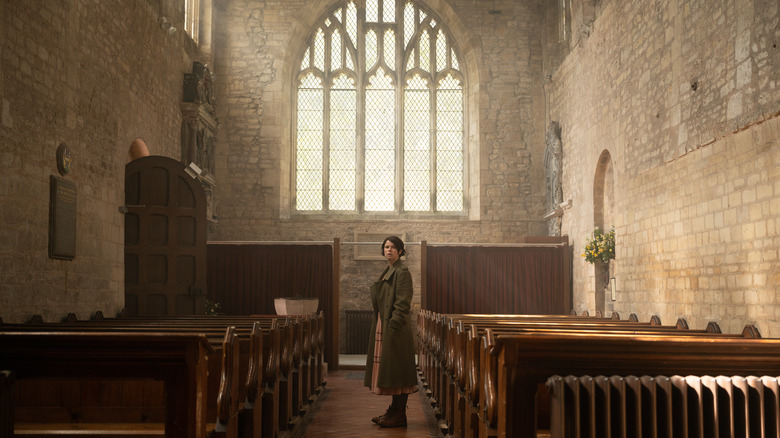Under The Radar: Men, Petite Maman, And More Underseen Gems From May
(Welcome to Under the Radar, a column where we spotlight specific movies, shows, trends, performances, or scenes that caught our eye and deserved more attention ... but otherwise flew under the radar. In this edition: Céline Sciamma's minimalist "Petite Maman" soars, Charline Bourgeois-Tacquet debuts with the brilliant "Anaïs in Love," and Alex Garland confounds and provokes in equal measure with "Men.")
Every word that James Gray said last week was right.
Admittedly, many critics, industry analysts, and even artists have sounded the alarm bells about the current state of affairs in the movie business far longer than I've been alive, bemoaning the failure to measure up to the glory days of old. And, to be fair, maybe they had ample reason to do so. Although in-the-moment prognostication will always be ripe for second-guessing in retrospect, look no further than the transition from silent film to "talkies," the Great Depression and World War II, the implementation of the Hays Code ... all of these examples represented some of the most pivotal moments in the history of film, for better or worse. Are we really going to compare ourselves to all that?
Well, when you consider how the studio system has gone all-in on the IP arms race at the expense of all else, corporate mergers have led to a larger slice of the marketplace controlled by alarmingly few decisionmakers, and, oh yeah, the arrival of a once-in-a-century pandemic on top of it all has further upset the delicate balance, suddenly it doesn't feel quite so outlandish to point out that we're headed towards (or have already arrived at) a crossroads of some kind.
All of which is to say that Gray's comments about why studios need to start taking risks on funding filmmaker-driven, mid-budget features again — despite the likelihood of losing money on them — felt so refreshing and so relevant to our own purposes here. Every single entry included in this month's column focuses on the specific types of movies that feel more and more like an endangered species these days. There's not much that any one individual can do to stem the overall tide, of course, but showing some love for the following movies from May would be a great start!
The everyday magic of Petite Maman
After "Portrait of a Lady on Fire" helped turn French filmmaker Céline Sciamma into a household name (and a Film Twitter sweetheart) in 2019, interested observers watched with bated breath to see how she'd choose to follow up on such breakout success. It'd probably be fair to say that few, if anyone, ever expected her next movie to resemble the low-key, minimalist, and largely plot-free trappings of "Petite Maman" ... but the brisk 72-minute film feels startlingly potent nonetheless.
The quiet and restrained story follows a young girl named Nelly (Joséphine Sanz) after the death of her ailing grandmother. Left with the unpleasant task of picking up the pieces from this devastating loss, Nelly's mother (Nina Meurisse) holds up as well as can be expected. On the melancholy car ride to her now-empty childhood home, the doting mother accepts her daughter's wordlessly sweet offer of chips and a drink while driving to their destination. It's the kind of small detail that fulfills a character function (the mother and daughter hold genuine affection for one another, which no death in the family can tear apart) as well as serves the story visually (the pair may share the same physical space of the car, but the sudden intrusion of Nelly's arm across the tight frame — rather than her face — only heightens the emotional disconnect between the two generations).
When Nelly's grieving mother slips out early one morning to deal with the loss alone and in her own way, Nelly is free to explore the surrounding forest in the hopes of coming across her parents' old childhood fort in the woods. She doesn't expect to come across another young girl named Marion (played by Joséphine's real-life sibling, Gabrielle Sanz) ... one who looks suspiciously similar to herself and bears her mother's own name.
Rather than suggest that Nelly's overactive imagination betrays an unreliable narrator, however, Sciamma instead opts for subtle little doses of fantasy amid this otherwise grounded drama to show that Nelly actually is interacting with her own mother as a child, somehow. The details aren't as important as the duo sharing several endearing moments together, behaving like fast friends even as their time together inevitably runs out. The final frame between Nelly and her (real) mother cuts deep, reasserting Céline Sciamma as an emotional force to be reckoned with.
Millennial ennui in Anaïs in Love
It's hard not to fall head over heels for the eponymous Anaïs (Anaïs Demoustier) pretty much as soon as the film starts, the young 20something frantically running through the French streets with her unwieldy bike in tow and an almost fevered expression on her face while the camera struggles to catch up with her. This proves a fitting introduction for someone desperate to outrun both life itself and the pervasive sense that she ought to be doing something other than flitting from lover to lover the moment her instinct tells her to cut bait. When she arrives in her apartment, a whirlwind of energy talking a mile a minute and late to an appointment (as she usually is), her landlady drops an early pearl of wisdom when Anaïs complains aloud about her own dysfunction in maintaining a relationship with someone she actually enjoys being with: "There's no 'normal.' We do what we can with what we are."
After an argument with her controlling on-again/off-again boyfriend Raoul, Anaïs finds a more acceptable arrangement in the affections of the much older adulterer, Daniel (Denis Podalydès). When this falls apart due to his lack of passion and inability to commit (her parting shot of "I like people who know what they want" cuts deep), her growing interest in Daniel's partner Emilie (Valeria Bruni Tedeschi) stirs up every pang of longing that bursts within her.
Those who've watched "The Worst Person in the World," or any movie in this vein, likely won't be surprised by any of the plot developments to come in Charline Bourgeois-Tacquet's feature film debut, "Anaïs in Love." A disillusioned but attractive young brunette grows increasingly dissatisfied with the overall course of her life, finally reaching a breaking point and seeking solace in the arms of an arguably even more misguided fling before arriving somewhere close to self-actualization. That'd be the uncharitable way to describe this dryly humorous and surprisingly tender romantic drama. The reality of experiencing this film (and its protagonist) is a completely different story.
"Anaïs in Love" steadily envelopes you through the strength of its lead character's charm, tenacity, and constant striving for something more — a profoundly relatable predicament to anyone who's ever found themselves in a relationship with the wrong person. The right one, however, might only be one elevator ride away.
There's more than meets the eye in Men
If ever there was a movie practically designed for viewers to lob the painfully easy criticism of "It all falls apart in the third act," it's Alex Garland's "Men." For a shocking amount of its runtime, the horror film is content to play things relatively straight. Reeling from the death of her troubled husband James (Paapa Essiedu), Jessie Buckley's haunted Harper retreats to a quiet countryside townhouse to heal. Nothing seems terribly out of place when she meets Geoffrey (Rory Kinnear), the busybody housekeeper who jokes about staying away from eating the "forbidden fruit" from the apple tree outside. But when she has a frightening encounter with the local vagrant (also played by Rory Kinnear ... you can probably tell where this is going) in the secluded woods surrounding the village and comes across several more unhelpful members of the small community, all of whom are wearing Rory Kinnear's face, Harper's would-be vacation turns into a never-ending nightmare that reaches new heights (depths?) of surrealism in the fraught and provocative final stretch.
/Film's Chris Evangelista kicked off his review by accurately pointing out that Garland "doesn't hold his audience's hand," a choice that the director himself admitted to doubling down on with "Men." As with "Ex Machina" and "Annihilation," "Men" pulls from an assortment of influences (some obvious, like the copious amounts of Biblical imagery, others more esoteric), all but demanding that viewers work to uncover what the story is really "about." His latest divisive movie is somehow even more alienating than his earlier efforts, practically going out of its way to confound audiences with a final act that has given rise to countless invocations of that "I know writers who use subtext, and they're all cowards" meme. But is it really as simple as all that?
Despite complaints that the film is operating on just one single note, I do believe "Men" has become the unfair recipient of viewers watering down Garland's ambitions after the fact. Yes, it's about grief, trauma, and survivor's guilt bequeathed by an emotionally weaponizing man in his final moments, but even a cursory glance at the potent folklore imagery and his unique penchant for dreamlike atmosphere suggest more nuanced aims.
"Men" offers up no easy answers, except one — that didactic, shallow readings might be the worst sin of all.



